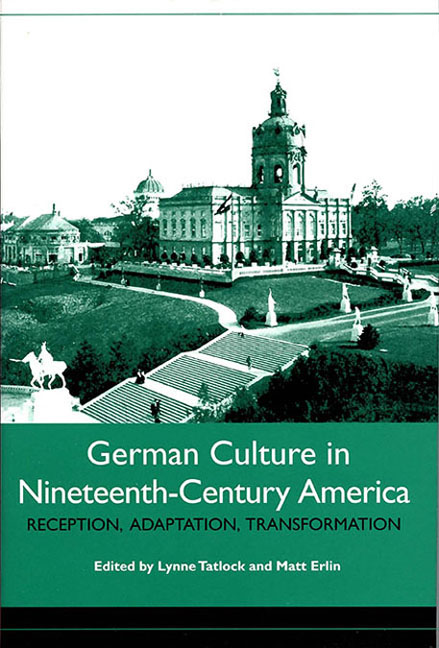Book contents
- Frontmatter
- Contents
- List of Illustrations
- Acknowledgments
- Introduction
- 1 Cultural Politics at the Turn of the Twentieth Century
- 2 In Pursuit of Intellectual Culture
- 3 Translation American Style
- Domesticated Romance and Capitalist Enterprise: Annis Lee Wister's Americanization of German Fiction
- Pictures of Travel: Heine in America
- Retroactive Dissimilation: Louis Untermeyer, the “American Heine”
- A Tramp Abroad and at Home: European and American Racism in Mark Twain
- 4 Immigration and Naturalization Acts
- Contributors
- Index
Domesticated Romance and Capitalist Enterprise: Annis Lee Wister's Americanization of German Fiction
from 3 - Translation American Style
Published online by Cambridge University Press: 13 April 2017
- Frontmatter
- Contents
- List of Illustrations
- Acknowledgments
- Introduction
- 1 Cultural Politics at the Turn of the Twentieth Century
- 2 In Pursuit of Intellectual Culture
- 3 Translation American Style
- Domesticated Romance and Capitalist Enterprise: Annis Lee Wister's Americanization of German Fiction
- Pictures of Travel: Heine in America
- Retroactive Dissimilation: Louis Untermeyer, the “American Heine”
- A Tramp Abroad and at Home: European and American Racism in Mark Twain
- 4 Immigration and Naturalization Acts
- Contributors
- Index
Summary
In Louisa Mae Alcott'sLittle Women Josephine March writes to her family of meeting a poor German professor, whom she will eventually marry. A “regular German,” he is humming Mignon's “Kennst du das Land” from Goethe's Wilhelm Meister “like a big bumble-bee.” Alcott modeled her apian Bhaer on Ralph Waldo Emerson, whom she adored, as well as on her sister May's art instructor, but the character also owes much to three real Germans: August Bopp, the forty-eighter Reinhold Solger, and the Goethe of her reading. From the perspective of the twenty-first century there may be much to criticize in Alcott's dispatching the independent Jo by means of a marriage to an older man. Yet in the composite German Professor Bhaer, Alcott created a clever — Alcott herself called it “funny” — match within the limitations of 1860s American fiction for a strong, somewhat eccentric female character with whom “brain developed earlier than heart” (LW, 332), who longs to pursue the life of the mind, to write stories, but not to be pushed to the margins of domestic felicity as a maiden aunt.
Although Mr. Bhaer dissuades Jo from writing sensation stories, thus temporarily shutting down her writing career, he reinforces her ambition for self-cultivation, enabling her to read Shakespeare and teaching her German by reading Schiller to her. She eventually finds her way back to writing books that, unlike her potboilers, which she had come to regret, entertain and edify. In a sequel, Jo's Boys, published nearly twenty years later in 1886, Josephine Bhaer, besides helping to run Plumfield School, has become a famous author of moral books for young folks, having returned to her original vocation during a financial crisis. “If all literary women had such thoughtful angels for husbands,” the now successful author declares, “they would live longer and write more.” Through a marriage to a German professor, Alcott's Jo has managed to realize her ambition and talent and yet to remain faithful to the middle-class domestic values of her era and the yearnings of her heart.
“Now don't laugh at his horrid name,” Jo writes her family, “it isn't pronounced either Bear or Beer, as people will say it, but something between the two, as only Germans can give it” (LW, 352).
- Type
- Chapter
- Information
- German Culture in Nineteenth-Century AmericaReception, Adaptation, Transformation, pp. 153 - 182Publisher: Boydell & BrewerPrint publication year: 2005



